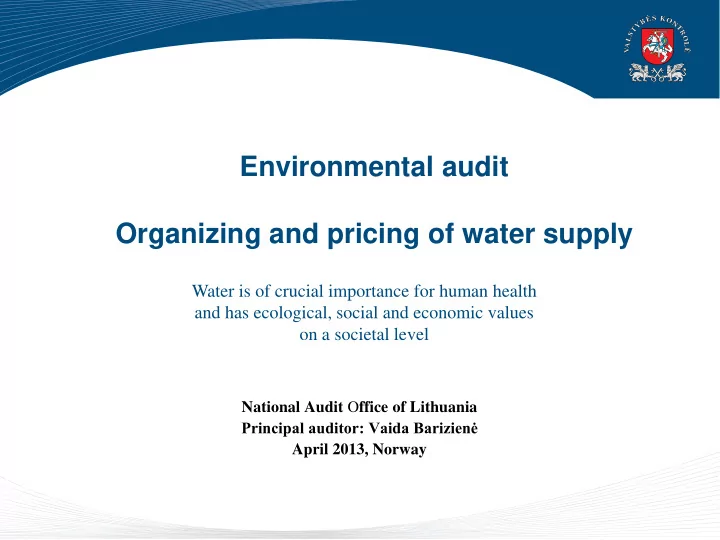

Environmental audit Organizing and pricing of water supply Water is of crucial importance for human health and has ecological, social and economic values on a societal level National Audit O ffice of Lithuania Principal auditor: Vaida Barizienė April 2013, Norway
Specific features of Lithuanian water sources • The drinking water used in Lithuania is extracted only from groundwater sources • Two thirds of the population have access to safe drinking water supplied by centralized water suppliers • The rest of the population use water from bore wells and fossil water wells • The water sector falls under the municipal sphere of influence • Lithuania is characterized by rather significant regional development differences
Aim of the audit To evaluate efficiency of the regulation and organization of water provision as well as accessibility of quality public services to citizens Audit subjects Ministry of Environment and National Control Commission for Prices an Energy Start and end of the audit April 2010 – January 2011 2009 – 2010 and some specific data from the period 2001 Audit period – 2008 Main audit criteria Level of achievement of the goals of the Law on Drinking Water Supply and Wastewater Management; Share of the population connected to the newly built water supply infrastructure; Ratio between the investments planned by water supply companies and those actually implemented Audit procedures and Analysis of relevant legislation, data collection, methods interviews, questionnaires to 60 municipalities, etc.
What did we find? The Law on Drinking Water Supply and Wastewater Management has not been implemented • There are 308 entities responsible for water supply instead of 10 (according the Law on Drinking Water Supply and Wastewater Management); • Only 36 municipalities instead of 60 have prepared water supply and wastewater management infrastructure development plans; • Water supply activities have not been licensed; • Municipalities have not selected public water suppliers.
What did we find? The goal to ensure that at least 95 per cent of the population are supplied with drinking water by a public water supplier and provided with wastewater management services by 2015 has not been achieved yet • The demand of investments was not identified before setting this goal; • Users’ possibilities to get connected to the infrastructure were not assessed; • Differences in the situation of municipalities and distribution of the population were not taken into account; • Capacities of water supply companies and other indicators were not taken into account.
What did we find? Long-term operation of the drinking water supply and wastewater management infrastructure has not been ensured • Prices of only one third of water supply companies providing water supply services are actually coordinated; • Municipalities do not ensure provision of water supply services at coordinated prices; • The price of water supply services in some municipalities is lower than the cost price; • Different pricing principles are applied to water supply companies.
What did we find? Continuity of the business of water supply companies has not been ensured • Most of water supply companies are loss-making; • The profit margin for each water supply company was determined individually; • Users pay for the investments which were planned but have not been implemented yet; • Renewal of the water supply sector is insufficient.
Audit recommendations • To the Government: to draft an amendment of the Law on Drinking Water Supply and Wastewater Management • To the National Control Commission for Prices and Energy: to draft amendments of the Drinking Water Supply and Wastewater Management Methodology
Implementation of audit recommendations • The Ministry of Environment commissioned a study “Renovation and development of water supply and wastewater management systems”. The study included an analysis of legislation, assessment of water management efficiency, etc.; • An amendment of the Law on Drinking Water Supply and Wastewater Management has been drafted and provided to the Seimas of the Republic of Lithuania for approval; • A Pricing Methodology for Drinking Water Supply and Wastewater Management Services has been approved taking into account the audit recommendations.
Lessons learned by auditors • To ensure comparability and reliability of the data, it was collected from various sources; • One of the most reliable evidence was visual inspection of the area; • To ensure objectivity, the water services pricing principles were compared with the pricing of services in other sectors; • Seeking to emphasize the problems of the audit, the audit report was supplemented with a closing chapter, which briefly summarized the problems identified during the audit.
THANK YOU
Recommend
More recommend